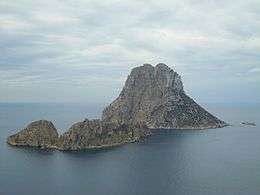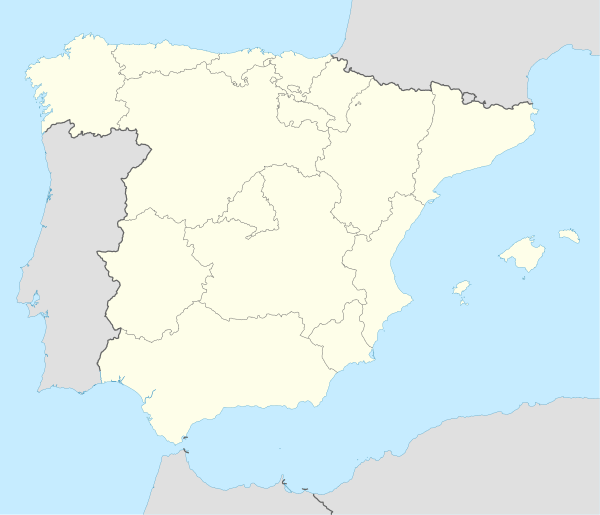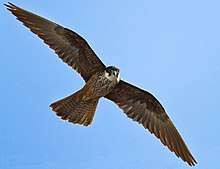Es Vedrà
Es Vedrà (Catalan pronunciation: [əz vəˈðɾa]) is a small rocky island off the south western seaboard of the Spanish island of Ibiza.[1] The island, which is 413 metres tall, is part of the Cala d’Hort nature reserve and lies 1.5423 miles (2.4821 km) off the coast at Cala d’Hort, which is in the municipality of Sant Josep de sa Talaia.[2] The island is uninhabited.[3]
 The island of Es Vedrà | |
 Es Vedrà | |
| Geography | |
|---|---|
| Location | Balearic Sea |
| Coordinates | 38°52′01″N 1°11′58″E |
| Archipelago | Balearic Archipelago |
| Administration | |
| Autonomous Community | Balearic Islands |
| Province | Ibiza |
| Municipality | Sant Josep |
| Demographics | |
| Population | 0 |
Geology
Es Vedrà consists predominantly of mesozoic[4] limestone, and contrary to the esoteric urban myth of being a special magnetic place, has no (magnetic) metal accumulations. The island we see today is as a result of a geological tumble.[4] 155 million years ago, continuous seismic movements in the Earth's crust caused great shifts in the Betica Mountain Range.[4] Eventually this caused the splitting of the range resulting in the formation of the Balearic Islands. Continued movement of the ridge which formed the islands caused portions to sheer and split away[4] from the islands. Es Vedrà, along with the satellite island of Illa Vedranell and the Illa Tagomago, are examples[4] of this action.
Habitation
The island has no human inhabitants, although in 1855[5] a Carmelite friar by the name of Francis Palau y Quer[5] once lived here for a short time following his exile from Catalonia.[5] The only inhabitants were a sub-species of wild goat but these were slaughtered by the local government in 2016 to protect the fauna of the island.[3] There is also a sub-species[6] of the Ibizan wall lizard[3] on the island. It is also home to a colony of the endangered bird of prey called Eleonora's falcon.[3]
Legends and mythology
The island is said to be home to sirens and sea-nymphs, who tried to lure Odysseus from his ship in Homer’s Odyssey.[5] It is also thought of as the holy island of the Tanit[3] the Phoenician lunar goddess, worshiped as the patron goddess and of fertility, who became Ibiza’s patroness. Legend has it that specific sacrifices were made to Tanit during full moons on the shore of the island.
The Giant of Es Vedrà
Es Vedrà is also the setting for one of Ibiza’s popular fables (Rondalles). Es Gegant des Vedrà (The Giant of Es Vedrà) is the tale about two brothers who, to cure their father of an incurable illness, had to go to Es Vedrà island to gather rock samphire and face the huge giant who lived on the island, huddled in one of the island's many caves. The two brothers’ ingenuity, along with the help of sea urchins, managed to debilitate the giant, and thus collect the samphire for the cure.
Francis Palau y Quer
The Carmelite friar Francis Palau y Quer arrived on Ibiza following his exile from Barcelona in 1855.[5] Needing solitude, he used to retire to Es Vedrà by rowing a boat,[5] to pray there and seek God's will. Legend says that he spent a week meditating surviving on nothing but rainwater he collected from drips from the roof of a cave he used for shelter. Within hours, he began to witness a series of powerful visions. He later described them in a book, called My Relations With the church[5]
My Relations with the Church
He started to write Mis Relaciones Con la Iglesia (My Relations With the Church), a sort of autobiographical journal, partly written in the idyllic solitude of Es Vedrà, transmitting his experience of the Church conceived as God and neighbors. Fr. Francisco Palau, O.C.D. was beatified in Rome by Pope John Paul II on April 24, 1988. His liturgical feast day is commemorated on November 7.
Es Vedrà in popular culture
- The island was used in some shots as the mystical island of Bali Hai in the Hollywood musical South Pacific.
- The island appears on the front cover of Mike Oldfield’s 1996 LP Voyager.
- The first track on the CD compilation, by DJ Tiësto called "In Search of Sunrise 6: Ibiza", is by Es Vedrà ("La Hacienda").
- Es Vedrà features in the background of a scene in the music video of Reflekt's "Need To Feel Loved".[7]
- DJ and trance producers Aly & Fila collaborated with The Thrillseekers to produce a trance song named after this island: "Es Vedrà".[8]
- The island appears on all front covers of "La Roca" CD compilations from Spanish DJ Nacho Sotomayor.
Gallery
 The endangered bird of prey called Eleanor's falcon
The endangered bird of prey called Eleanor's falcon- Sunset over Es Vedrà
 Es Vedrà viewed from a drone
Es Vedrà viewed from a drone
References
- Mapa Topografico Nacional de Espana, 798 Eivissa. 1:50.000. Published: IGN – CNIG (Spain Civilian Survey): 2006.
- "579 Regional Map, Spain, Islas Baleares. Pub:Michelin Editions des Voyages, 2004, ISBN 2-06-710098-X
- The Rough Guide to Ibiza & Formentera. Pub:Rough Guides, Penguin Group, 2003, ISBN 1-84353-063-5
- The History Buff’s Guide to Ibiza. Author: Emily Kaufman. Published: Tarita, S.L. ISBN 84-607-1188-9
- The White Island, The Colourful History of the Original Fantasy Island, Ibiza. Author: Stephen Armstrong. Published: Corgi. ISBN 0-552-77189-9
- Info on Sub-species of wall lizards Archived 2014-03-23 at the Wayback Machine
- Music video featuring Es Vedrá
- Music for the track
| Wikimedia Commons has media related to Es Vedrà. |